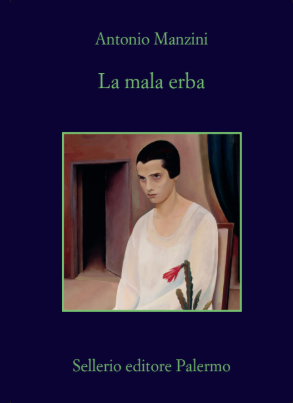La mala erba

Antonio Manzini's new novel, blackest and meanest Italy, evil as the only chance for redemption.
In Samantha's small room the poster of a wolf woman, "long hair, yellow eyes, a body to take your breath away, claws instead of nails," a woman who does not give up in front of anything and knows how to defend herself and pull out her teeth, stands out on the wall. Samantha, on the other hand, at 17, has gathered only sadness in life and has no future ahead of her. It is not just the poverty of the family; it is that people like her no longer have a place they can call their own in the order of the universe. The same is true of all the inhabitants of Colle San Martino: wasted lives, individuals who, though elbow to elbow, drag their existences in total solitude, each with his own sordid secrets, without ever a moment of collective life, without anything that is a common thing. Over the village dominate, respectively from the top of the manor house and the church tower, Cicci Bellè, "owner of everything," and a reactionary priest, Father Graziano. The two hate and fight each other; they oppress and exploit, impose blackmail and conditioning. Cicci Bellè has only one affection, for her son Mariuccio, a 32-year-old big boy with the brain of a 5-year-old; Father Graziano always carries his nephew Faustino, a spoiled child cared for by a silent Russian woman, Ljuba. Samantha has no comfort in the boy she is engaged to, not even in her conformist schoolmates; she can only communicate with her friend Nadia. Amid seedy events that intertwine within the walls of homes, the challenges of the two bullies and the vagaries of a tragic fate first bring down the protagonist, later allow her to take revenge on her life with a reckless blow, just like a real wolf woman; an accident, a serious bereavement, an act of madness, are the ironies of life that little Samantha manages to take advantage of. The pen of Antonio Manzini, who described a character carved in readers' memories as Rocco Schiavone, depicts individuals and stories of vivid and pitiless realism in a noir without a crime, a novel of a lonely girl and at the same time the choral tale of a small town. A kind of happy ending turns everything into a sour fairy tale. But behind this appearance, the wolf woman's final sneer makes it clear that La mala erba is also something else: it is a novel about the gloom dissolve of two overbearing men, about revenge that does not restore justice, about the inexorable and repetitive cycle of oppression in a marginalized province that is nothing more than the immense, isolated province in which we all live.